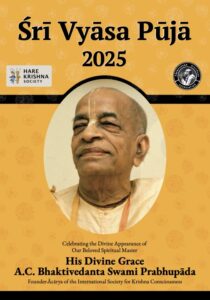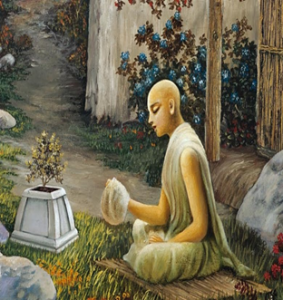SB 10.8.46 purport…The Lord is approached by four kinds of pious men (ārto jijñāsur arthārthī jñānī ca), but here we see that Nanda Mahārāja and Yaśodā surpassed all of them. Therefore Parīkṣit Mahārāja naturally inquired, “What kind of pious activities did they perform in their past lives by which they achieved such a stage of perfection?” Of course, Nanda Mahārāja and Yaśodā are accepted as the father and mother of Kṛṣṇa, yet mother Yaśodā was more fortunate than Nanda Mahārāja, Kṛṣṇa’s father, because Nanda Mahārāja was sometimes separated from Kṛṣṇa whereas Yaśodā, Kṛṣṇa’s mother, was not separated from Kṛṣṇa at any moment. From Kṛṣṇa’s babyhood to His childhood and from His childhood to His youth, mother Yaśodā was always in association with Kṛṣṇa. Even when Kṛṣṇa was grown up, He would go to Vṛndāvana and sit on the lap of mother Yaśodā. Therefore there is no comparison to the fortune of mother Yaśodā, and Parīkṣit Mahārāja naturally inquired, yaśodā ca mahā-bhāgā.
SB 10.8.47–Although Kṛṣṇa was so pleased with Vasudeva and Devakī that He descended as their son, they could not enjoy Kṛṣṇa’s magnanimous childhood pastimes,which are so great that simply chanting about them vanquishes the contamination of the material world. NandaMahārāja and Yaśodā, however, enjoyed these pastimes fully, and therefore their position is always better than that of Vasudeva and Devakī.
SB 10.8.48 purport….When Kṛṣṇa descends anywhere, He is accompanied by His own associates. These associates are not ordinary living beings. Kṛṣṇa’s pastimes are eternal, and when He descends, He comes with His associates. Therefore Nanda and mother Yaśodā are the eternal father and mother of Kṛṣṇa. This means that whenever Kṛṣṇa descends, Nanda and Yaśodā, as well as Vasudeva and Devakī, also descend as the Lord’s father and mother. Their personalities are expansions of Kṛṣṇa’s personal body; they are not ordinary living beings. Mahārāja Parīkṣit knew this, but he was curious to know from Śukadeva Gosvāmī whether it is possible for an ordinary human being to come to this stage by sādhana-siddhi. There are two kinds of perfection—nitya-siddhi and sādhana-siddhi. A nitya-siddha is one who is eternally Kṛṣṇa’s associate, an expansion of Kṛṣṇa’s personal body, whereas a sādhana-siddha is an ordinary human being who, by executing pious activities and following regulative principles of devotional service, also comes to that stage. Thus the purpose of Mahārāja Parīkṣit’s inquiry was to determine whether an ordinary human being can attain the position of mother Yaśodā and Nanda Mahārāja. Śukadeva Gosvāmī answered this question as follows.
SB 10.8.49--Droṇa and Dharā said: Please permit us to be born on the planet earth so that after our appearance, the Supreme Lord, the Personality of Godhead, the supreme controller and master of all planets, will also appear and spread devotional service, the ultimate goal of life, so that those born in this material world may very easily be delivered from the miserable condition of materialistic life by accepting this devotional service.
PURPORT-This statement by Droṇa clearly indicates that Droṇa and Dharā are the eternal father and mother of Kṛṣṇa. Whenever there is a necessity of Kṛṣṇa’s appearance, Droṇa and Dharā appear first, and then Kṛṣṇa appears. …Before Kṛṣṇa’s appearance, Droṇa and Dharā appear in order to become His father and mother. It is they who appear as Nanda Mahārāja and his wife, Yaśodā. In other words, it is not possible for a sādhana-siddha living being to become the father or mother of Kṛṣṇa, for Kṛṣṇa’s father and mother are already designated. But by following the principles exhibited by Nanda Mahārāja and Yaśodā and their associates, the inhabitants of Vṛndāvana, ordinary living beings may attain such affection as exhibited by Nanda and Yaśodā.…Foolish persons do not know how risky life is here if one does not follow the instructions of Kṛṣṇa. The Kṛṣṇa consciousness movement, therefore, has been started so that by practicing Kṛṣṇa consciousness one can avoid the risky life of this material existence. There is no question of accepting or not accepting Kṛṣṇa consciousness. It is not optional; it is compulsory. If we do not take to Kṛṣṇa consciousness, our life is very risky. Everything is explained in Bhagavad-gītā. Therefore, to learn how to become free from the miserable condition of material existence, Bhagavad-gītā As It Is is the preliminary study.Then, if one understands Bhagavad-gītā, one can proceed to Śrīmad-Bhāgavatam, and if one advances further, one may study Caitanya-caritāmṛta. We are therefore presenting these invaluable books to the whole world so that people may study them and be happy, being delivered from miserable conditional life.
SB 10.8.5..purport
…“As the embodied soul continually passes, in this body, from boyhood to youth to old age, the soul similarly passes into another body at death. The self-realized soul is not bewildered by such a change.” (Bg. 2.13) Kṛṣṇa, the greatest authority, says that the body will change. And as soon as the body changes, one’s whole program of work changes also. Today I am a human being or a great personality, but with a little deviation from nature’s law, I shall have to accept a different type of body. Today I am a human being, but tomorrow I may become a dog, and then whatever activities I have performed in this life will be a failure. This simple truth is now rarely understood, but one who is a dhīra can understand this.
Ekadasi breakfast for the Lords-mango, banana, nectarines, avocado and hot raw milk with almonds




